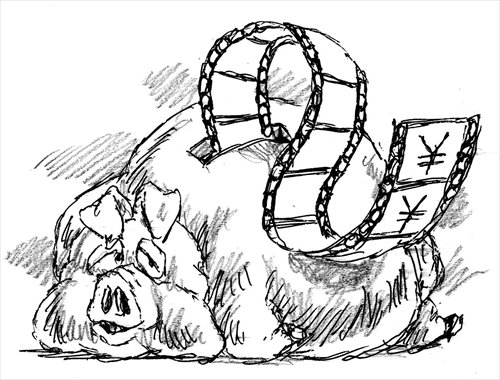Big-name directors get snippy over TV adaptations

Illustration: Peter C. Espina/GT
The gloves are off and punches are being thrown among Chinese filmmakers, as an astronomical number of students are now on their winter vacation and many more in a festive mood for the coming Chinese New Year.
The Running Man, an adaptation of a high-profile reality TV show in which celebrities took part in a cooperative competition of outdoor missions, has taken an aggressive lead. It was able to run wild on the silver screen battlefield and run away with 400 million yuan ($64 million) at the box office to date.
This dark horse, however, was shot down by a loose cannon. Feng Xiaogang, one of China's best directors, fired the first exchange recently by moaning that the film industry will decay due to such movies, which are produced like a bat out of the hell based on popular TV programs, possessing neither sincerity nor artistic value.
Despite its soaring sales, The Running Man is being roundly rubbished by critics, scoring 3.3 out of 10 on Douban.com, the country's biggest online movie review community. Viewers made no bones about its flaccid story telling and even wobblier character portrayals.
Such a scenario was shared by Dad! Where Are We Going? in the same period last year. This spin-off from a reality TV show of the same name recorded how five male celebrities pulled off tasks in the countryside with their adorable kids. It took only five days to shoot and grossed 700 million yuan ($110 million).
Unlike the common run of movie categories, The Running Man is merely a run-of-the-mill finale of a TV variety show aired on the silver screen, barely worthy of the title of motion picture.
Riding on the popularity of the original television shows plus a devoted fan base, such films save a lot on script writing, casting, and marketing. Therefore, they can pony up only a small budget, rack up big bucks and audiences everywhere, or at least in China.
No wonder movie maestros feel a kick in the stomach. How dare these mongrel stallions bounce about on the prairies that we blue-blooded steeds are trudging through? How come you get the best oats while we have to gnaw on grass?
In the wake of their stampede lies a mess. If these no-brainer potboilers can benefit producers and investors, why bother to plow cash and effort into hammering out big-budget, full-length, humane serious movies whose return on investment still hangs in the air? Insiders may wonder and whine while swathes of speculators have already jumped on the bandwagon of the nation's robust film market.
EntGroup, a media think tank, reported that 830 million Chinese went to the cinema and paid 29.6 billion yuan ($4.73 billion) for tickets in 2014. Young people, with money to burn and time to kill, find cinemas a good place for courtship and recreation, especially in the dark.
Nevertheless suffice to say, our filmdom is besotted with the bottom line and thus bring a plethora of copycats, chick flicks, and dog-and-pony shows. Moviegoers are just hearty spoils ready to be divided up between cannibalistic producers looking for a taste of their fat wallets.
No denying several commercial hits but critical flops grip the screen. Meanwhile though, more refreshing pictures get two thumbs up from spectators, whose more picky appetite cannot be spoon-fed by popcorn whets any longer.
For instance, 2014 saw the nation's long sidelined art-house films do a roaring trade. Audiences' enthusiasm for TV adaptations will zoom out but their love for classic movies will never die.
If Feng wants what is best for the industry, he should release a masterpiece to at least beat his Personal Tailor last year, which was nothing but a potpourri of revue sketches on televised Spring Festival gala.
The author is a Shanghai-based freelance writer. opinion@globaltimes.com.cn